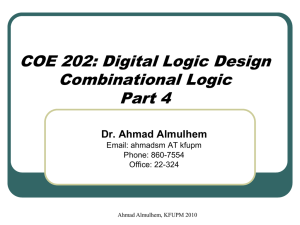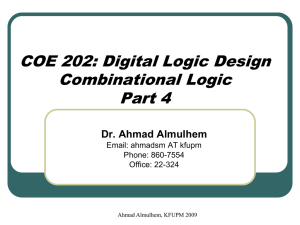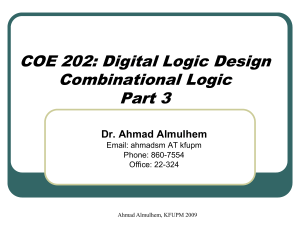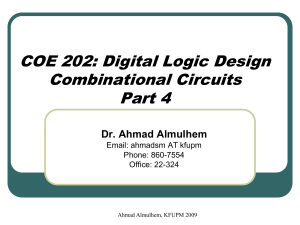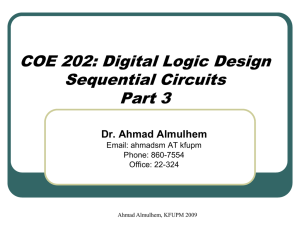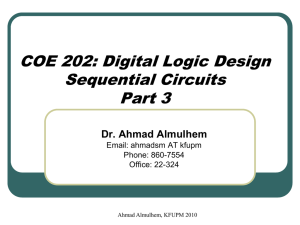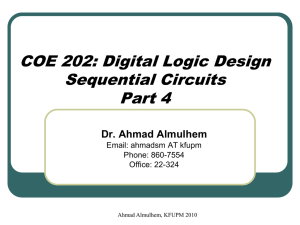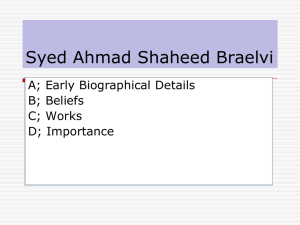ppt
advertisement
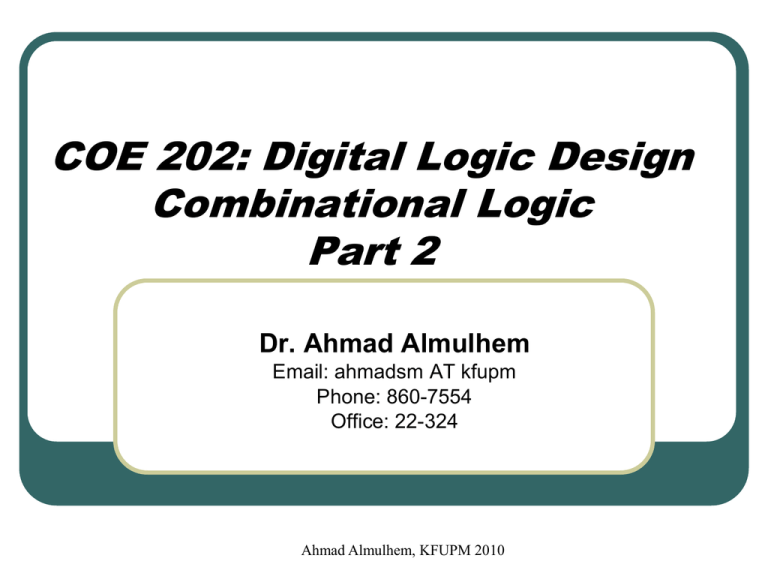
COE 202: Digital Logic Design
Combinational Logic
Part 2
Dr. Ahmad Almulhem
Email: ahmadsm AT kfupm
Phone: 860-7554
Office: 22-324
Ahmad Almulhem, KFUPM 2010
Objectives
• Minterms and Maxterms
• From truth table to Boolean expression
• Sum of minterms
• Product of Maxterms.
• Standard and Canonical Forms
• Implementation of Standard Forms
• Practical Aspects of Logic Gates
Ahmad Almulhem, KFUPM 2010
Minterms
• A product term is a term where literals are ANDed.
• Example: x’y’, xz, xyz, …
• A minterm is a product term in which all variables appear
exactly once, in normal or complemented form
• Example: F(x,y,z) has 8 minterms: x’y’z’, x’y’z, x’yz’, ...
• I‰
n general, a function with n variables has 2n minterms
• A minterm equals 1 at exactly one input combination and
is equal to 0 otherwize
• Example: x’y’z’ = 1 only when x=0, y=0, z=0
• A minterm is denoted as mi where i corresponds the input
combination at which this minterm is equal to 1
Ahmad Almulhem, KFUPM 2010
Minterms
Src: Mano’s book
Variable complemented if 0
Variable uncomplemented if 1
mi indicated the ith minterm
i indicates the binary combination
mi is equal to 1 for ONLY THAT combination
Ahmad Almulhem, KFUPM 2010
Maxterms
• A sum term is a term where literals are ORed.
• Example: x’+y’, x+z, x+y+z, …
• A maxterm is a sum term in which all variables appear
exactly once, in normal or complemented form
• Example: F(x,y,z) has 8 maxterms: (x+y+z), (x+y+z’), (x+y’+z), ...
• I‰
n general, a function with n variables has 2n maxterms
• A maxterm equals 0 at exactly one input combination and
is equal to 1 otherwize
• Example: (x+y+z) = 0 only when x=0, y=0, z=0
• A maxterm is denoted as Mi where i corresponds the
input combination at which this maxterm is equal to 0
Ahmad Almulhem, KFUPM 2010
Maxterms
Src: Mano’s book
Variable complemented if 1
Variable not complemented if 0
Mi indicated the ith maxterm
i indicates the binary combination
Mi is equal to 0 for ONLY THAT combination
Ahmad Almulhem, KFUPM 2010
Minterms and Maxterms
In general, a function of n variables has
• 2n minterms: m0, m1, …, m2n-1
• 2n maxterms: M0, M1, …, M2n-1
Minterms and maxterms are the complement of
each other!
Example: F(X,Y):
m2 = XY’ m2’ = X’+Y = M2
Ahmad Almulhem, KFUPM 2010
Expressing Functions with Minterms
•
A Boolean function can be expressed algebraically from a give truth
table by forming the logical sum (OR) of ALL the minterms that produce
1 in the function
Example:
Consider the function defined by the truth table
F(X,Y,Z) = X’Y’Z’ + X’YZ’ + XY’Z + XYZ
= m0
+ m2 + m5 + m7
= Sm(0,2,5,7)
X
0
0
0
0
1
1
1
1
Ahmad Almulhem, KFUPM 2010
Y
0
0
1
1
0
0
1
1
Z
0
1
0
1
0
1
0
1
m
m0
m1
m2
m3
m4
m5
m6
m7
F
1
0
1
0
0
1
0
1
Expressing Functions with Maxterms
•
A Boolean function can be expressed algebraically from a give truth
table by forming the logical product (AND) of ALL the maxterms that
produce 0 in the function
Example:
Consider the function defined by the truth table
F(X,Y,Z) = M(1,3,4,6)
Applying DeMorgan
F’ = m1 + m3 + m4 + m6
= Sm(1,3,4,6)
F = F’’ = [m1 + m3 + m4 + m6]’
= m1’.m3’.m4’.m6’
= M1.M3.M4.M6
= M(1,3,4,6)
X
0
0
0
0
1
1
1
1
Y
0
0
1
1
0
0
1
1
Z
0
1
0
1
0
1
0
1
M
M0
M1
M2
M3
M4
M5
M6
M7
Note the indices in this list are those that are
missing from the previous list in Sm(0,2,5,7)
Ahmad Almulhem, KFUPM 2010
F
1
0
1
0
0
1
0
1
F’
0
1
0
1
1
0
1
0
Sum of Minterms vs Product of
Maxterms
• A Boolean function can be expressed
algebraically as:
• The sum of minterms
• The product of maxterms
• Given the truth table, writing F as
• ∑mi – for all minterms that produce 1 in the table,
or
• Mi – for all maxterms that produce 0 in the table
• Minterms and Maxterms are complement of
each other.
Ahmad Almulhem, KFUPM 2010
Example
•
Write E = Y’ + X’Z’ in the
form of Smi and Mi?
• Solution: Method1
First construct the Truth
Table as shown
Second:
E = Sm(0,1,2,4,5), and
E = M(3,6,7)
X
0
0
0
0
1
1
1
1
Y
0
0
1
1
0
0
1
1
Ahmad Almulhem, KFUPM 2010
Z
0
1
0
1
0
1
0
1
m
m0
m1
m2
m3
m4
m5
m6
m7
M
M0
M1
M2
M3
M4
M5
M6
M7
E
1
1
1
0
1
1
0
0
Example (Cont.)
Solution: Method2_a
E = Y’ + X’Z’
= Y’(X+X’)(Z+Z’) + X’Z’(Y+Y’)
= (XY’+X’Y’)(Z+Z’) + X’YZ’+X’Z’Y’
= XY’Z+X’Y’Z+XY’Z’+X’Y’Z’+
X’YZ’+X’Z’Y’
= m5 + m1 + m4 + m0 + m2 + m0
= m0 + m1 + m2 + m4 + m5
= Sm(0,1,2,4,5)
Solution: Method2_b
E = Y’ + X’Z’
E’ = Y(X+Z)
= YX + YZ
= YX(Z+Z’) + YZ(X+X’)
= XYZ+XYZ’+X’YZ
E = (X’+Y’+Z’)(X’+Y’+Z)(X+Y’+Z’)
= M7 . M6 . M3
= M(3,6,7)
To find the form Mi, consider the
remaining indices
E = M(3,6,7)
To find the form Smi, consider the
remaining indices
E = Sm(0,1,2,4,5)
Ahmad Almulhem, KFUPM 2010
Example
Question: F (a,b,c,d) = ∑m(0,1,2,4,5,7), What are the
minterms and maxterms of F and and its complement F?
Solution:
F has 4 variables; 24 possible minterms/maxterms
F (a,b,c,d) = ∑m(0,1,2,4,5,7)
= Π M(3,6,8,9,10,11,12,13,14,15)
F (a,b,c,d) = ∑m(3,6,8,9,10,11,12,13,14,15)
= Π M(0,1,2,4,5,7)
Ahmad Almulhem, KFUPM 2010
Example
Question: F (a,b,c,d) = ∑m(0,1,2,4,5,7), What are the
minterms and maxterms of F and and its complement F?
Solution:
F has 4 variables; 24 = 16 possible minterms/maxterms
F (a,b,c,d) = ∑m(0,1,2,4,5,7)
= Π M(3,6,8,9,10,11,12,13,14,15)
F (a,b,c,d) = ∑m(3,6,8,9,10,11,12,13,14,15)
= Π M(0,1,2,4,5,7)
Ahmad Almulhem, KFUPM 2010
Canonical Forms
The sum of minterms and the product of
maxterms forms are known as the
canonical forms ( )الصيغ القانونيةof a
function.
Ahmad Almulhem, KFUPM 2010
Standard Forms
• Sum of Products (SOP) and Product of
Sums (POS) are also standard forms
• AB+CD = (A+C)(B+C)(A+D)(B+D)
• The sum of minterms is a special case of
the SOP form, where all product terms are
minterms
• The product of maxterms is a special case
of the POS form, where all sum terms are
maxterms
Ahmad Almulhem, KFUPM 2010
SOP and POS Conversion
SOP POS
POS SOP
F = (A’+B)(A’+C)(C+D)
F = AB + CD
= (AB+C)(AB+D)
= (A’+BC)(C+D)
= (A+C)(B+C)(AB+D)
= A’C+A’D+BCC+BCD
= (A+C)(B+C)(A+D)(B+D)
= A’C+A’D+BC+BCD
= A’C+A’D+BC
Hint 1: Use id15: X+YZ=(X+Y)(X+Z)
Hint 1: Use id15 (X+Y)(X+Z)=X+YZ
Hint 2: Factor
Hint 2: Multiply
Ahmad Almulhem, KFUPM 2010
SOP and POS Conversion
SOP POS
POS SOP
F = (A’+B)(A’+C)(C+D)
F = AB + CD
= (AB+C)(AB+D)
= (A’+BC)(C+D)
= (A+C)(B+C)(AB+D)
= A’C+A’D+BCC+BCD
= (A+C)(B+C)(A+D)(B+D)
= A’C+A’D+BC+BCD
= A’C+A’D+BC
Hint 1: Use id15: X+YZ=(X+Y)(X+Z)
Hint 1: Use id15 (X+Y)(X+Z)=X+YZ
Hint 2: Factor
Hint 2: Multiply
Question1: How to convert SOP to sum of minterms?
Question2: How to convert POS to product of maxterms?
Ahmad Almulhem, KFUPM 2010
Implementation of SOP
Any SOP expression can be
implemented using 2levels of gates
The 1st level consists of AND
gates, and the 2nd level
consists of a single OR
gate
Also called 2-level Circuit
Ahmad Almulhem, KFUPM 2010
Implementation of POS
Any POS expression can be
implemented using 2levels of gates
The 1st level consists of OR
gates, and the 2nd level
consists of a single AND
gate
Also called 2-level Circuit
Ahmad Almulhem, KFUPM 2010
Implementation of SOP
•
Consider F = AB + C(D+E)
•
•
•
This expression is NOT in the sum-of-products form
Use the identities/algebraic manipulation to convert to a
standard form (sum of products), as in F = AB + CD + CE
Logic Diagrams:
A
B
A
B
F
C
F
C
D
C
E
D
E
3-level circuit
Ahmad Almulhem, KFUPM 2010
2-level circuit
Practical Aspects of Logic Gates
•Logic gates are built with transistors as
integrated circuits (IC) or chips.
•ICs are digital devices built using various
technologies.
•Complementary metal oxide semiconductor
(CMOS) technology
•Level s of Integration:
•Small Scale Integrated (SSI) < 10 gates
•Medium Scale Integrated (MSI) < 100 gates
•Large Scale Integrated (LSI) < 1000 gates
•Very Large Scale Integrated (VLSI) < 106
gates
NOT gate
Ahmad Almulhem, KFUPM 2010
Practical Aspects of Logic Gates
•Key characteristics of ICs are:
•Voltages ranges
•Noise Margin
•Gate propagation delay/speed
•Fan-in and Fan-out
•Buffers
•Tri-state Gates
NOT gate
Ahmad Almulhem, KFUPM 2010
Voltage Levels
• Logic values of 0 & 1 corresponds to voltage level
• A range of voltage defines logic 0 and logic 1.
• Any value outside this range is invalid.
+5V
Illegal
Voltage
Range
+0V
Ahmad Almulhem, KFUPM 2010
Noise Margins
Vcc
5.0 V
11Logic
LogicLevel
Level
1-Level
Noise Margin
Guaranteed
Output Levels
Forbidden
Forbidden
Region
Accepted
Input Levels
0-Level
Noise Margin
Logic Level
Level
00 Logic
Ahmad Almulhem, KFUPM 2010
Propagation Delay
• Propagation delay (tpd) is the time for a change in the
input of a gate to propagate to the output
• High-to-low (tphl) and low-to-high (tplh) output signal changes may
have different propagation delays
• tpd = max {tphl, tphl)
• A circuit is considered to be fast, if its propagation delay
is less (ideally as close to 0 as possible)
Delay is usually measured
between the 50% levels
of the signal
Ahmad Almulhem, KFUPM 2010
Timing Diagram
• The timing diagram shows the input and output signals
in the form of a waveform
• It also shows delays
Inputs
Propagation
Delay of the
Circuit = τ
X
Y
Output
Z
Timing Diagram for an AND gate
Ahmad Almulhem, KFUPM 2010
Time
Fanin
• Fan in of a gate is the number of inputs to the
gate
• A 3-input OR gate has a fanin = 3
• There is a limitation on the fanin
• Larger fanin generally implies slower gates
(higher propagation delays)
Fanin = 4
Fanin = 1
Ahmad Almulhem, KFUPM 2010
Fanin = ?
Fanout
• Fan out of a gate is the number of gates that it can
drive
•
The driven gate is called a load
• Fan out is limited due to
• Current in TTL
• Propagation delays in CMOS
driving gate
(driver)
load gates
(load)
Fanout = 3
Ahmad Almulhem, KFUPM 2010
Fanout
Driving more gates than maximum fanout
Use high drive buffers
Use multiple drivers
Ahmad Almulhem, KFUPM 2010
Tristate Gates
• Gates with 3 output values 0, 1, Hi-Z
• Hi-Z behaves like an open circuit.
E X
Z
1 0
1
1 1
0
0 0
High Z
0 1
High Z
Ahmad Almulhem, KFUPM 2010
Tristate Gates
Q: Can we connect the outputs
of two gates?
Ahmad Almulhem, KFUPM 2010
Tristate Gates
Q: Can we connect the outputs
of two gates?
Ahmad Almulhem, KFUPM 2010
Tristate Gates
Q: Can we connect the outputs
of two gates?
Two or more tri-state outputs may be
connected provided that only one
of these outputs is enabled while all
others are in the Hi-Z state.
Ahmad Almulhem, KFUPM 2010
